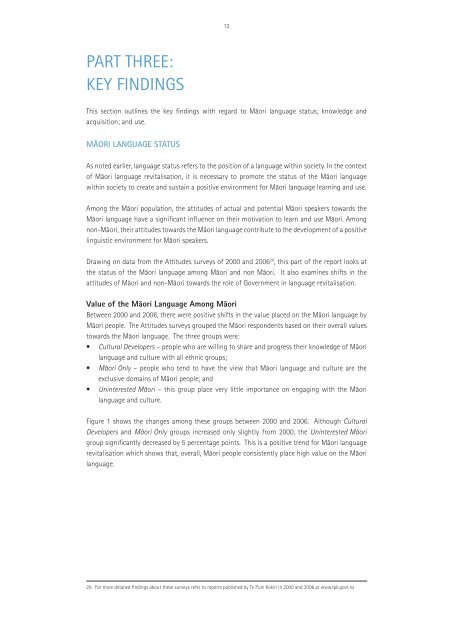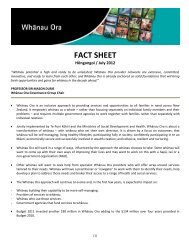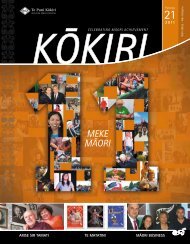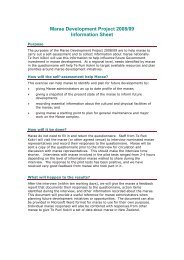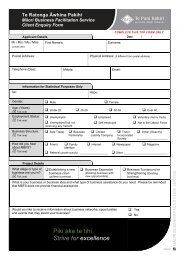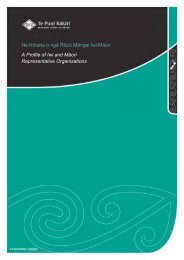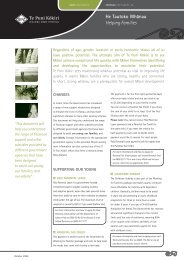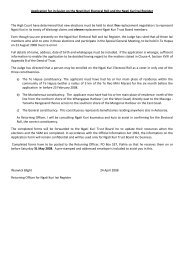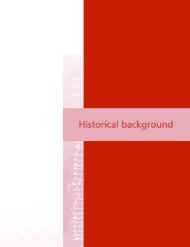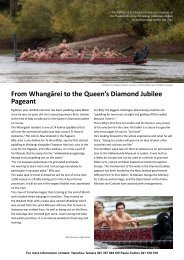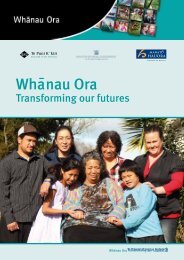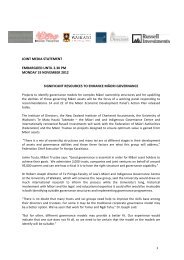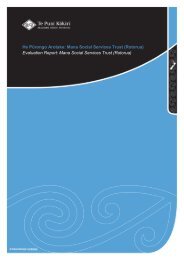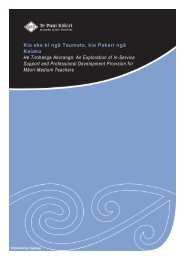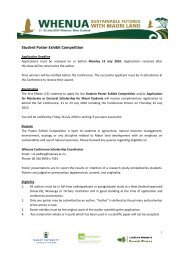The Health of the Maori Language in 2006 - Te Puni Kokiri
The Health of the Maori Language in 2006 - Te Puni Kokiri
The Health of the Maori Language in 2006 - Te Puni Kokiri
You also want an ePaper? Increase the reach of your titles
YUMPU automatically turns print PDFs into web optimized ePapers that Google loves.
12<br />
PART THREE:<br />
KEY FINDINGS<br />
This section outl<strong>in</strong>es <strong>the</strong> key f<strong>in</strong>d<strong>in</strong>gs with regard to Mäori language status; knowledge and<br />
acquisition; and use.<br />
MÄORI LANGUAGE STATUS<br />
As noted earlier, language status refers to <strong>the</strong> position <strong>of</strong> a language with<strong>in</strong> society. In <strong>the</strong> context<br />
<strong>of</strong> Mäori language revitalisation, it is necessary to promote <strong>the</strong> status <strong>of</strong> <strong>the</strong> Mäori language<br />
with<strong>in</strong> society to create and susta<strong>in</strong> a positive environment for Mäori language learn<strong>in</strong>g and use.<br />
Among <strong>the</strong> Mäori population, <strong>the</strong> attitudes <strong>of</strong> actual and potential Mäori speakers towards <strong>the</strong><br />
Mäori language have a significant <strong>in</strong>fluence on <strong>the</strong>ir motivation to learn and use Mäori. Among<br />
non-Mäori, <strong>the</strong>ir attitudes towards <strong>the</strong> Mäori language contribute to <strong>the</strong> development <strong>of</strong> a positive<br />
l<strong>in</strong>guistic environment for Mäori speakers.<br />
Draw<strong>in</strong>g on data from <strong>the</strong> Attitudes surveys <strong>of</strong> 2000 and <strong>2006</strong> 20 , this part <strong>of</strong> <strong>the</strong> report looks at<br />
<strong>the</strong> status <strong>of</strong> <strong>the</strong> Mäori language among Mäori and non Mäori. It also exam<strong>in</strong>es shifts <strong>in</strong> <strong>the</strong><br />
attitudes <strong>of</strong> Mäori and non-Mäori towards <strong>the</strong> role <strong>of</strong> Government <strong>in</strong> language revitalisation.<br />
Value <strong>of</strong> <strong>the</strong> Mäori <strong>Language</strong> Among Mäori<br />
Between 2000 and <strong>2006</strong>, <strong>the</strong>re were positive shifts <strong>in</strong> <strong>the</strong> value placed on <strong>the</strong> Mäori language by<br />
Mäori people. <strong>The</strong> Attitudes surveys grouped <strong>the</strong> Mäori respondents based on <strong>the</strong>ir overall values<br />
towards <strong>the</strong> Mäori language. <strong>The</strong> three groups were:<br />
• Cultural Developers – people who are will<strong>in</strong>g to share and progress <strong>the</strong>ir knowledge <strong>of</strong> Mäori<br />
language and culture with all ethnic groups;<br />
• Mäori Only – people who tend to have <strong>the</strong> view that Mäori language and culture are <strong>the</strong><br />
exclusive doma<strong>in</strong>s <strong>of</strong> Mäori people; and<br />
• Un<strong>in</strong>terested Mäori – this group place very little importance on engag<strong>in</strong>g with <strong>the</strong> Mäori<br />
language and culture.<br />
Figure 1 shows <strong>the</strong> changes among <strong>the</strong>se groups between 2000 and <strong>2006</strong>. Although Cultural<br />
Developers and Mäori Only groups <strong>in</strong>creased only slightly from 2000, <strong>the</strong> Un<strong>in</strong>terested Mäori<br />
group significantly decreased by 5 percentage po<strong>in</strong>ts. This is a positive trend for Mäori language<br />
revitalisation which shows that, overall, Mäori people consistently place high value on <strong>the</strong> Mäori<br />
language.<br />
20. For more detailed f<strong>in</strong>d<strong>in</strong>gs about <strong>the</strong>se surveys refer to reports published by <strong>Te</strong> <strong>Puni</strong> <strong>Kokiri</strong> <strong>in</strong> 2000 and <strong>2006</strong> at www.tpk.govt.nz


